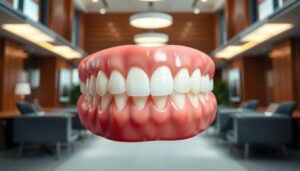Keeping your gums healthy is key to a healthy mouth. Bad gum health can lead to gum disease, which is serious. To fight this, eating right and taking supplements are good steps.
A diet rich in nutrients can help your gums a lot. We will look at foods and supplements that are good for your gums. This will help you keep your gums in top shape.
Understanding Gum Health and Its Importance
Gum health is key to good oral health. Healthy gums support teeth and protect the bone underneath. Keeping gums healthy is vital for preventing gum disease and staying well.
The Role of Gums in Oral Health
Gums protect against harmful bacteria and microorganisms. They keep teeth stable, preventing them from moving or falling out. Healthy gums also help keep your smile bright, boosting your confidence and self-esteem.
Consequences of Poor Gum Health
Poor gum health can lead to serious problems. It can cause gum disease, which is an inflammation and infection. This can result in bad breath, gum recession, and even tooth loss.
Knowing these risks highlights the need for gum disease prevention. It’s important to take action to protect your gums.
Common Gum Problems
Many people face issues like gingivitis and periodontitis. Gingivitis is an early gum disease that makes gums swell and bleed. If not treated, it can turn into periodontitis, damaging gums and bone.
It’s crucial to tackle these problems early to keep your gums healthy.
Nutrients Essential for Promoting Gum Health
Gum health depends on getting the right nutrients. Vitamins, minerals, and antioxidants are key for healthy gums. Knowing what to eat is important for good oral health.
Vitamins That Support Gum Health
Vitamins C and D are crucial for gums. Vitamin C helps make collagen, keeping gums strong. Without enough, gums may bleed and face health problems. Vitamin D helps the body absorb calcium, which also strengthens gums.
The Importance of Minerals
Minerals like calcium and phosphorus are vital for oral health. Calcium makes teeth and gums strong. Phosphorus keeps teeth hard and strong. Having enough of these minerals can prevent gum disease.
Antioxidants and Their Benefits
Antioxidants are important for gum health. They fight inflammation and oxidative stress in gums. Foods like berries and green tea are full of antioxidants. They help prevent gum disease and boost overall health.
Foods to Include in a Gum Health Diet
A good gum health diet can really help your gums. Eating certain foods can make your gums stronger. Here are some foods that are great for your gums.
Leafy Greens and Their Impact
Leafy greens like spinach, kale, and collard greens are full of vitamins and minerals. They have lots of Vitamin K, which helps keep bones and teeth strong. Eating them every day can help your gums heal and get stronger.
Nuts and Seeds for Healthy Gums
Nuts like almonds and walnuts, and seeds like chia and flaxseeds, are good for your gums. They have healthy fats, minerals, and vitamin E. These nutrients help keep your gums healthy and fight off diseases.
Fruits That Promote Gum Health
Citrus fruits like oranges and grapefruits are full of vitamin C, which is good for your gums. Fruits like strawberries and kiwi also have antioxidants that fight inflammation. Eating these fruits regularly helps make a strong gum health diet and keeps your mouth clean.
The Importance of Hydration for Gum Health
Drinking enough water is key for healthy gums and overall mouth health. Water helps prevent dry mouth and supports many body processes. These processes are vital for keeping gums in top shape.
Effects of Dehydration on Oral Health
Not drinking enough water can harm your mouth. It can cause dry mouth, which raises the risk of gum disease and cavities. Saliva is important because it cleans your mouth and fights acid from bacteria.
Without enough water, your body makes less saliva. This makes your gums more likely to get inflamed and infected. Bacteria can then grow, hurting your gums and possibly leading to bigger dental problems.
Ideal Water Intake Recommendations
Drinking the right amount of water is crucial for staying hydrated and healthy. Most people should drink about eight 8-ounce glasses a day, which is about two liters. But, your needs might change based on your age, how active you are, and where you live.
It’s important to listen to your body and drink water all day. This helps keep your gums healthy and lowers the chance of mouth problems.
Supplements That Can Aid Gum Health
Keeping your gums healthy often means using a mix of diet and supplements. Certain supplements can really help your gums, boosting your body’s natural defenses. Knowing about these dental supplements helps you choose the right ones for your gum health.
Popular Dental Supplements
Many dental supplements are known for their benefits to gum health. Here are some to consider:
- Vitamin C: It’s full of antioxidants, helping repair and grow gum tissue.
- CoQ10: This might cut down gum inflammation, helping your gums stay healthy.
- Omega-3 Fatty Acids: Found in fish oil, they fight inflammation and keep gums healthy.
- Probiotics: These good bacteria help keep your mouth’s microbiome balanced.
Evaluating the Efficacy of Supplements
Before adding supplements to your gum care routine, check if they work. Look for scientific studies and clinical trials that back their use. These studies show how supplements can reduce inflammation and improve gum health.
Talking to a healthcare provider is key to using supplements safely and effectively. This careful approach helps you make the best choices for your gum health.
Foods and Drinks to Avoid for Healthy Gums
Keeping your gums healthy means knowing what to eat and drink. Some foods and drinks can harm your gums and mouth. Knowing what to avoid helps you make better food choices.
Sugary Contributions to Gum Disease
Eating too much sugar leads to plaque buildup. This buildup causes gum disease because bacteria feed on sugar and make acids. These acids hurt the gums. It’s important to cut down on sugary snacks and drinks for healthier gums.
Acidic Foods and Beverage Risks
Acidic foods and drinks can wear down tooth enamel and irritate gums. Drinking sodas, eating citrus fruits, and using vinegar in dressings can harm your mouth. Cutting back on these acidic items helps keep your gums strong and protects your teeth.
Processed Foods to Limit
Processed foods often have unhealthy fats and added sugars that are bad for you. They can cause inflammation and lead to gum problems. It’s best to eat less of these processed foods and choose whole, nutritious foods instead.
Lifestyle Factors Influencing Gum Health
Many lifestyle choices can harm your gums. Smoking is especially bad for your gums. Knowing how these choices affect your mouth can help you make better choices.
Smoking and Its Impact on Gum Health
Smoking hurts your gums a lot. It makes gum disease more likely because it affects blood flow and healing. This makes it hard for your body to fight off infections.
Smoking also hides early signs of gum disease. So, smokers need to see their dentist often to check their gums.
Oral Hygiene Practices
Good oral hygiene is key for healthy gums. Here are some important steps:
- Brush your teeth at least twice a day with fluoride toothpaste.
- Floss every day to clean between your teeth.
- Use antibacterial mouthwash to kill bacteria that harm your gums.
These habits are crucial for keeping your gums healthy. Sticking to them helps prevent gum disease and keeps your mouth healthy.
Incorporating a Gum Health Diet into Daily Life
To keep your gums healthy, eating right is key. It’s easy to add nutritious foods to your day. Snacks that help your gums and a balanced diet are crucial for lasting health.
Meal Planning Tips
Planning meals for gum health means picking foods full of good stuff. Here are some tips:
- Add leafy greens to your meals for vitamins.
- Choose whole grains for fiber, which helps your mouth.
- Try fruits like apples and oranges to clean your teeth.
Easy Snacks for Healthy Gums
Healthy snacks are great for your gums. Here are some easy ones:
- Raw veggies like carrots and celery clean your teeth.
- Nuts are full of good fats and proteins, easy to take with you.
- Plain yogurt has probiotics, good for your gums and health.
Creating a Balanced Diet
A balanced diet for your mouth means eating in moderation and variety. Mix proteins, healthy fats, and carbs to strengthen your gums. Eating whole foods more often helps your overall health. Adjusting how much you eat and when can also boost gum health.
Consulting Professionals for Optimal Gum Health
Keeping your gums healthy often requires teamwork. Regular dental visits are key to catching and treating problems early. If you notice your gums swelling, bleeding, or hurting, see a dentist right away. Getting help quickly is crucial for good gum health.
When to See a Dentist
Don’t wait for emergencies to see the dentist. Regular check-ups and cleanings are vital to prevent gum disease. Early signs of gum problems mean dentists can act fast, keeping your mouth healthy for years.
Working with a Nutritionist
Seeing a nutritionist for gum health is also important. They can help you understand how diet affects your gums. A nutritionist can suggest foods that strengthen your gums, making a big difference in your health.
Importance of Regular Check-ups
Regular dental visits are essential. They let professionals track your progress and adjust your care plan. Whether it’s dental visits or nutrition advice, getting professional help is key to keeping your gums healthy.




